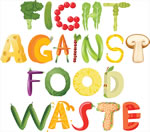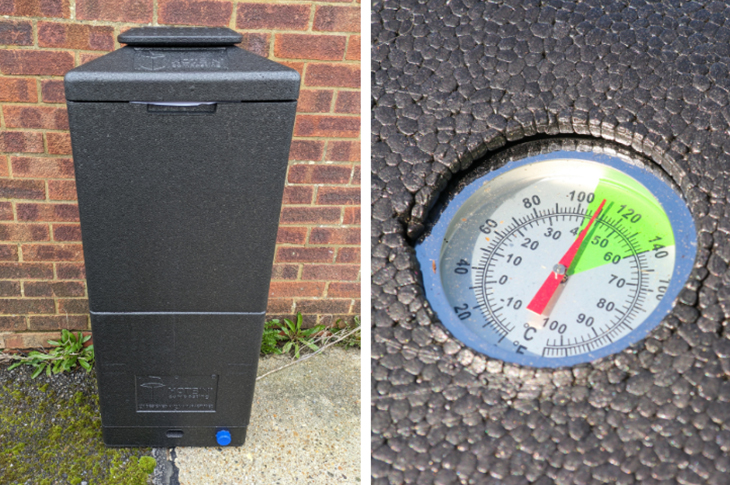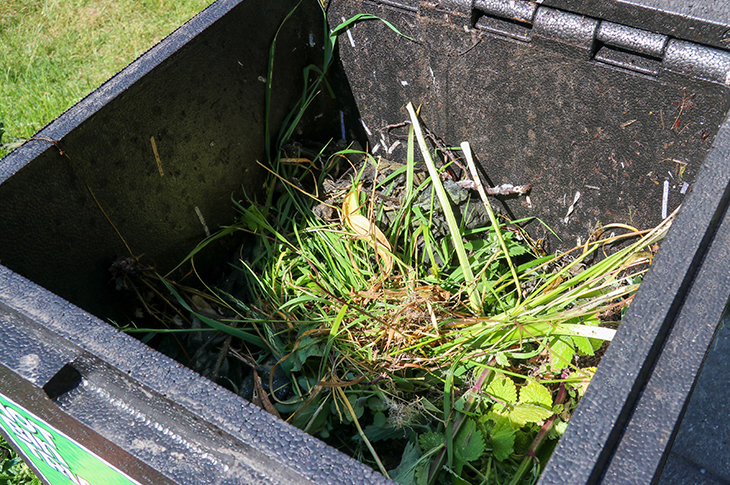Food waste
Adur and Worthing residents' top tips for reducing food waste at home
In April 2024 we asked you to tell us your top tips for reducing food waste at home to be in with a chance of winning one of six hot bin composters, given to us by West Sussex County Council.
By heating the waste up to 60°C, hot bins can turn food waste into compost in 30 to 90 days and produce a liquid fertiliser that has great benefits for plants and flowers.
Hot bins, however, are not cheap to buy, so we wanted to hear how you reduce food waste or make use of leftovers in your home.
The winning tips are:
Rachel's tip ...
- I reduce food waste by using the stalks of cauliflower and broccoli and batch-cook curry using up any veg that's past its best and putting it in the freezer.
Lis' tips ...

- Stalks and ends of vegetables can be roughly chopped and stored in the freezer to be made into a quick soup.
- Fermented foods such as sauerkraut and kimchi are easy to make in old jam jars using cabbage, onions, carrots, salt and water.
- Batch-cooking meat dishes and freezing in portion-sized containers also helps reduce energy use in cooking.
- Eggshells can be dried and ground up to use as a slug and snail deterrent in the garden.
- Remove fruit from plastic packaging and keep in a fruit bowl rather than the fridge so that you remember to eat it.
- Set up a food share group with friends and neighbours so that if you have too much of something it can be offered to the group. It's a nice way to share recipes and cooking tips too.
- Dry shop-bought or garden herbs by hanging them in the kitchen. They can be put in jam jars once dry and used for months after.
- Chop and freeze fresh ginger.
- Fresh chillies can be frozen whole.
- Ripen avocados individually by putting one in a paper bag with a banana overnight to use the next day.
Sam's tips ...

- Practise first in, first out - arrange your food so that older items are at the front, encouraging you to use them first.
- Monitor your waste - keep an eye on what you throw away to identify patterns and make adjustments to your buying and cooking habits.
- Freeze excess food - freeze food if you won't have the chance to eat it before it goes bad.
- Remember to label and date frozen food. You can put small portions of cooked food in ice cube moulds (for instance if you have leftover wine and you need some for cooking).
- Engage in community efforts - participate in local food-saving initiatives, such as community fridges or food-sharing apps.
- Herbs and spices often get thrown away - some community shops sell you as much or as little as you need - consider buying smaller portions for meals.
Hayley's tips ...
- We use eggshells and tea from used tea bags in the garden/plant pots to help them grow.
- We planted food scraps like lettuce, garlic and celery as an experiment during Covid with the kids. We also grow the seeds from peppers and tomatoes.
- If we have cream and we don't use it all we whisk it into butter.
- If we have fresh herbs we mix them in oil and freeze them in ice cube trays.
- We only have a small outdoor space so we grow plants and herbs in pots and veg boxes.
Ewa's tips ...

- Do not go shopping when you are hungry, as you usually buy more than you need.
- Be resistant to some marketing offers like 'buy three and get the fourth for free'.
- The better policy is to buy less, buy better quality.
- Do not look for perfect vegetables or fruits - products that are a bit different have the same taste and are equally healthy.
- Learn how to make preserves. Too much fruit? Make a jam. Too many tomatoes? Make passata. Too many chillies? Make sriracha sauce.
- Pickling and fermenting are also good ways to extend the life of some food products.
- Use vegetable peels. Have you ever watched Nanny McPhee? Wise people know how much good stuff the peel contains!
Corryne's tips ...

- To reduce food waste in our home I have stopped shopping weekly and instead moved to fortnightly.
- I use Mason jars to store fruit in the fridge to give it a longer fridge life (strawberries can stay good for over a week and half if airtight).
- I put a piece of kitchen roll in salad bags - this reduces the moisture getting to the salad and keeps it fresher for longer.
- I freeze two slices of bread in sandwich bags and re-use the bags each time for the next loaf.
- If I'm out and about I stop in local shops to find yellow sticker (reduced) items and plan a meal around what goodies I find.
- We grow our own fruit and veg in warmer weather and try to grow enough to freeze to last over the winter. This includes potatoes, pumpkins, onions, carrots and strawberries. I share what I don't need with neighbours and friends.
- I use apps such as Olio and Too Good to Go to help fight food waste and get delicious food at half the cost or free! These can often be hot meals, saving energy and money on cooking too.
Photos: a hot bin showing its temperature gauge and items inside it


Food word images: credit West Sussex County Council (WSCC)

Need assistance with this service?
Get in touch:
Recycling, Refuse & Waste (including bin day queries)
Page last updated: 17 June 2024


 01903 851729
01903 851729